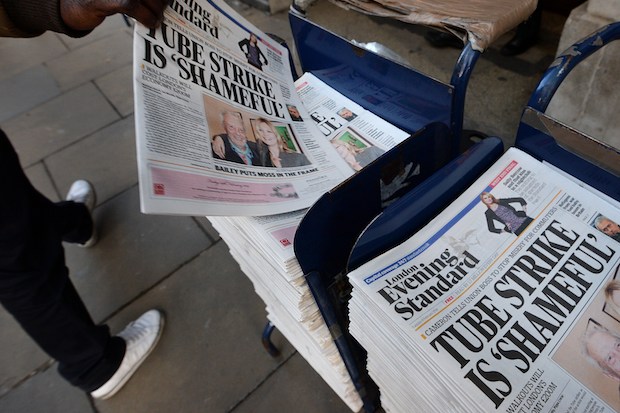Just over two years ago, London Tube drivers negotiated a package that took their pay to £52,000 – around £10,000 more than the average Londoner. And yet tonight these drivers, along with other Underground staff, will go on strike – over a planned overhaul of how stations operate.
But will it be much of a strike? Only 30 per cent of RMT members actually backed Bob Crow’s plan to strike (60 per cent abstained) and Boris Johnson is doing a pretty good job of keeping the show on the road (or in the tunnel). Of London Underground’s 12 underground lines, 10 will be running. The trains will be less frequent, of course, perhaps five to ten minutes apart. But in general, Comrade Crow’s attempt to close the network down have failed. This is what the Tube will look like during the strike: 
How are so many lines staying open? The RMT represents around a third of the Tube drivers, while the ASLEF union, which isn’t striking, represent the other two thirds. Transport for London are unsure of how many staff will turn up, but judging by the low numbers who voted for this strike, they are bullish about keeping the Tube running. Volunteers are also helping keep some stations open.
There is a danger for Comrade Bob that these striking tactics are becoming irrelevant. The Pathé newsreel above from a 1962 strike shows that industrial action back then would have closed the whole network. As Boris Johnson put to the RMT leader on his radio show this morning, Bob is more interested in flexing muscles and making a public point instead of doing what is best for Londoners and most of his members — the RMT ballot had a 40 per cent turnout:
‘’This is really about muscle-flexing and power. The RMT know they have absolutely no chance of stopping this. It is inevitable. But what they need to do is to show to their members, and their future possible members, that London Underground can’t make changes without this kind of industrial action.
‘I can’t sit down and negotiate with you, let alone on air, when you are holding a gun to Londoners’ heads and threatening disruption to the greatest city on earth.’
Given all the fuss, the proposals themselves are rather tame. 750 ticket office jobs are to be made redundant, but TfL stresses there will be a job for everyone who is willing to be flexible. There are no plans for any compulsory redundancies. Boris said today that a thousand people have showed interest in taking voluntary redundancy whilst TfL said they’ve had 450 formal applications so far. In their own words, ‘there shouldn’t be any problems’, were it not for the bolshy unions.
The fact that TfL isn’t asking anyone to leave, simply to be flexible, is what makes this strike so baffling. By resisting such calls, the unions are ultimately damaging the workers they are paid to represent. Trade unions who work with employers, such as Unite at the Ellesmere Port car plant, are more likely to save their workforces through the very flexibility Crow is refusing to contemplate. So if you're not even causing that much chaos, or helping your members in the long-term, what's the point, Bob?
See also: Sorry RMT, there’s no proof the public support the Tube strikes






Comments